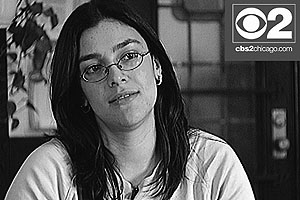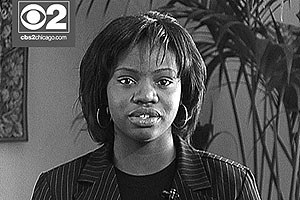In the News
The Chronicle’s biweekly column In the News offers a digest of commentary and quotations by a few of the University faculty members, students and alumni who have been headlining the news in recent weeks. Chicago faculty members are some of the most frequently quoted experts, so space allows publishing references to only selected examples. To read many of the full newspaper articles mentioned in this column, visit the In the News column at the University News Office Web site: http://www-news.uchicago.edu/. If you are aware of news articles that feature the University or its faculty, students and/or alumni, feel free to bring them to the attention of the Chronicle editor to be considered for In the News. News clips may be sent to ldavis@uchicago.edu.
 As part of the recent CAPS Diversity in the Law Day, CBS-Channel 2 news interviewed first-year Rosa Newman (below) and fourth-year Yenisey Rodriguez (above). Newman’s lifelong desire to become a lawyer grew stronger after a day of events that allowed her and other legal hopefuls to meet with attorneys, law school faculty and not-for-profit organizations focused on legal work. Rodriguez, a Cuban American, said law school had once been a goal, but she has chosen instead to join a Ph.D. program in public policy.  | |
Stephen Weber, Assistant Professor of Infectious Diseases in Medicine and Director of the Infection Control Program at the University Hospitals, was quoted in a Wednesday, March 22 Associated Press newswire story. The article reported on steps hospitals nationwide are taking to prepare for a possible U.S. outbreak of the avian flu. The Centers for Disease Control already have cautioned that all possible bird flu cases be investigated at hospitals to ward off an outbreak. The University Hospitals, the article noted, has already begun to take precautionary steps by routinely asking patients with flu symptoms about any recent travel to places where bird flu has infected humans. If physicians suspect bird flu has infected a patient, they would isolate the patient from all other hospital patients and staff, said Weber. “This is a trigger for what’s called the bio-outbreak response plan,” Weber told AP, noting that his office would then be contacted and the person on call there “would immediately drop what they’re doing” and head to the treatment area. The patient’s fluid samples would be tested in isolation in a state laboratory, he added. “The last thing you want to do is send a sample to the hospital lab and grow it. What happens then is you get a concentration of bird flu virus that could put lab workers at risk.”
Tobias Moskowitz, Professor of Finance and the Neubauer Family Faculty Fellow in the Graduate School of Business, discussed his new research on bank mergers during a live interview on CNBC’s Tuesday, March 21 Closing Bell program. Moskowitz found that big bank mergers lead to an increase in property crimes, an increase in commercial loan interest rates and a decrease in loan size. The study was earlier reported in The New York Times.
David Galenson, Professor in Economics, spoke about creativity with host Kai Ryssdal on the National Public Radio program Marketplace Tuesday, March 21. Galenson discussed his book Old Masters and Young Geniuses, in which he sets out his theory that artists fall into one of two categories in their careers: either they are experimental artists, whose works improve and gain attention over time, or conceptual artists, whose best works are created early in their careers.
Geoffrey Stone, the Harry Kalven Jr. Distinguished Service Professor in the Law School, wrote an op-ed that appeared in the Monday, March 13 Chicago Tribune. Stone, an expert on constitutional law and civil rights, wrote that Americans should care that the National Security Agency has been conducting electronic surveillance on Americans without obtaining warrants. Stone asked hypothetically: “Why would you care about being watched if you’re not a criminal and if the only thing the watchers care about is whether you are? Stone gave three answers as to why privacy should be regarded as precious. 1. “Perhaps being free means knowing you’re not being watched by the government, without a good reason.” 2. “Once the government gathers information about you, it then has the capacity to use that information in ways that have nothing to do with terrorists. Information is power, and power can (and usually will) be abused.” 3. “For a self-governing society to function, the citizen must feel that he is the governor, not the subject. Perhaps it is difficult to feel like the governor when your government monitors your every move. Perhaps limiting government surveillance is essential to democracy.”
Barbara Schneider, Director of the Data Research and Development Center and Co-Director of the Alfred P. Sloan Center on Working Families, was the main source for a Thursday, March 9 Miami Herald story, which provided working parents with ways to alleviate stressful schedules and bring more balance into their busy lives. “Working parents are taking work home and not necessarily being compensated for it. The number of hours parents are spending on work is astronomical. When men and women multi-task, they don’t feel good. And their stress can impact the entire family,” said Schneider, who is co-editor of the book, Being Together, Working Apart: Dual-Career Families and the Work-Life Balance. “There are no quick fixes,” she added. “But we need to work together to make our lives more livable and to make our children and ourselves more successful as people.”
James Brorson, Associate Professor in Neurology and Cell Physiology, was interviewed for a Wednesday, March 15 Chicago Tribune article that reported on how well patients recover from mild strokes. The article appeared shortly after Cook County Board President John Stroger had suffered a stroke and was hospitalized. “Most patients make a substantial recovery—they get quite a bit better with rehabilitation,” said Brorson. Stroger, he said, was lucky to have been treated with TPA, tissue plasminogen activator, which breaks up blood clots that typically are the cause of strokes. “TPA has been shown to improve the chance for a good recovery down the road, including a recovery with no deficit whatsoever, or very little, manageable deficit.”
Pradeep Chintagunta, Professor of Marketing in the GSB, commented in the Friday, March 17 Chicago Sun-Times on the new incentives banks are offering to lure new customers to bank with them. The Cleveland-based National City bank has begun to offer one of the best incentive programs among its competitors. “Having opened all these branches, banks have to make sure there’s enough traffic,” said Chintagunta. “Consumers are very reluctant to switch banks, so you really need to offer some strong incentives.”
Richard Schilsky, Professor of Hematology/Oncology in Medicine and Associate Dean of Clinical Research in the Biological Sciences Division, was featured in front-page story published in the Sunday, March 19 Chicago Tribune. Schilsky, a cancer researcher and principal investigator for nearly a dozen clinical trials, never stops hoping for the day cancer will be a manageable disease. “I predict that, 15 years from now, we won’t be treating so many advanced cancers. Our focus will be on treating preclinical cancers—essentially, on prevention.” Both families of cancer patients and colleagues praise Schilsky’s tireless efforts to give cancer patients better treatments and care. “He never lied to my husband,” said Violet Passalaqua, whose husband Michael’s cancer was stabilized by an experimental drug before he died of pneumonia. “He said the experimental drug might not prolong his life, but it would preserve his quality of life. And he was true to his word.”
Alumnus James Swanson (A.B.,’81) was featured in a Wednesday, March 15 New York Times story about his new book, Manhunt: The 12-Day Chase for Lincoln’s Killer, which has become the most popular history book in the country, holding at No. 5 on The New York Times bestseller list. Swanson’s fascination with the story of Abraham Lincoln’s assassination and the days that followed began early in his life at the age of 10. He later studied American history at the University, where he became friends with former faculty member and historian John Hope Franklin. “What I liked about him,” said Franklin in the NYT article, “was his thoroughness and diligence and his capacity to pursue a subject to the bitter end. When I read the book I smiled and said, ‘There is James.’” Swanson said he might write a follow-up to the book. “I don’t think I could get away from this story if I wanted to. It’s been in me since I was 10 years old. I don’t really want to get away.”
Grace Wolf-Chase, Senior Research Associate in Astronomy & Astrophysics and an astronomer at the Adler Planetarium, was featured in a Chicago Sun-Times column published Wednesday, March 22. Wolf-Chase is helping to coordinate the planetarium’s fall workshop Pale Blue Dot III, which will bring scientists from around the world to discuss their interests in the possibility of life outside Earth’s solar system. Wolf-Chase, who studies at the University how stars are born, said the question of whether life exists elsewhere raises issues that go beyond science and into areas such as religion and history. “Within the next 10 to 20 years, we might very well find evidence that life exists elsewhere. That will raise lots of questions among people worldwide.”
![[Chronicle]](/images/sidebar_header_oct06.gif)